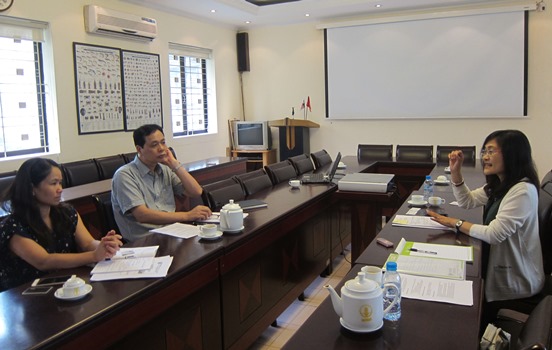In order to begin implementing the Food Safety Project (FSP) funded by the New Zealand Aid Program, Mekong Institute (MI) has conducted a visit to Hanoi, Vietnam to meet with relevant stakeholders in food safety management system last July 6 -7, 2016.
In the meetings with high and mid-level officials from Ministry of Agriculture and Rural Development (MARD), Ministry of Health (MOH) and Ministry of Industry and Trade (MOIT), Ms. Maria Theresa S. Medialdia, Director of Agricultural Development and Commercialization Department introduced MI and the FSP to key partners. She mentioned that the project will support “policy makers in Cambodia, Lao PDR, Myanmar and Viet Nam (CLMV) responsible for developing and implementing food safety regulations to create an enabling food regulatory environment connected to private sector, their needs and market aspirations”.
“Vegetables are highly processed and consumed every day in Vietnam”, Dr. Nguyen Nhu Tiep, Director General of the National Agro-Forestry-Fishery Quality Assurance Department, MARD started the discussion giving updates about the food safety situation of Vietnam to MI. He added that “at the moment, the chemical abuse in vegetables is very high; residues of antibiotics in pork and poultry meat is not too high, but abuse of growth formaldehyde and salbutamol is rampant; hygiene condition of slaughter houses is poor; and the rate of microbial contamination in fresh meat is also high. These products are of our highest concern and priority for the time being”. Whereas, according to Mr. Nguyen Quang Thao, Head of Food Safety Division, Science and Technology Department, MOIT, one of the challenges in their management area is food safety control at the market. At the moment, there are around 7,000 market control officials from central to district levels, but they lack knowledge in food safety management and monitoring. Moreover, food safety legal regulations are only issued in milk, vegetable oil, beverages, but not in powder and alcohol.
Regarding the training needs, they all agreed that the trainings should focus on reviewing and updating technical regulations; capacity building for staff in developing legal documents for food safety inspection; raising public awareness in food safety; and improving the enforcement of legal documents at central and lower levels.
In Vietnam, the Food Safety Law has come to effect since 2011. At the moment, the Vietnam Food Administration under MOH is taking the lead in developing an assessment plan after 5 years of implementation. The Vietnamese government has also set food safety as one of its high priority tasks in the next few years.








